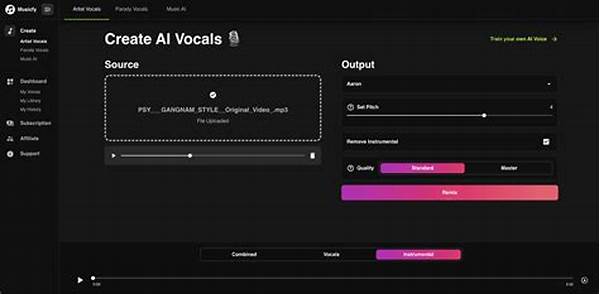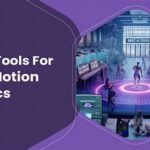Music is the universal language that connects us all, and there’s nothing quite like the thrill of hearing a track that captures our hearts and gets stuck in our heads. But did you know that artificial intelligence (AI) is playing an increasingly pivotal role in the creation of these hit songs? This technology, with its ability to analyze and replicate musical patterns, is revolutionizing the music industry by assisting artists in crafting chart-toppers. In this article, we’ll dive into the captivating story of how musicians use AI to create hit songs and how this collaboration between creativity and technology is transforming the art of music.
Read More : Why Ai Music Tools Are Gaining Popularity
Picture a musician sitting in their studio, surrounded by an assortment of instruments, a computer brimming with software, and a little something extra – AI. This advanced technology acts as a collaborator, essential for the brainstorming process. AI can analyze successful songs from various genres and decades, identifying common threads that resonate with listeners. Through machine learning, it suggests chord progressions, lyrical themes, and even melodies that are more likely to become hits. For instance, an AI tool might suggest that blending electro-pop beats with folk-style lyrics could be a winning combination. Musicians, armed with this data, can incorporate these insights into their work, enhancing creativity without stifling their unique artistic vision.
The potential for AI in the music industry goes beyond mere analysis. AI can also create music from scratch, providing artists with a foundation to build upon. Take an example of a budding songwriter known for crafting heartfelt ballads. This artist might use AI-generated melodies to add an unexpected twist to their work, blending their organic style with something fresh and experimental. This collaboration allows musicians to push boundaries and explore uncharted territories in their creative journey. By tapping into AI’s ability to think outside the box, artists can elevate their music-making process to new heights, reaching audiences they never thought possible.
Moreover, AI’s impact extends to enhancing the production quality of songs. Imagine an AI-driven program that suggests the perfect reverb setting for vocals, tailoring effects to suit the mood of the song. The precision of AI assists musicians in achieving studio-quality sound without requiring a team of engineers. This democratization of music production means that even independent artists working from home can compete with big productions, leveling the playing field and bringing more diverse voices to the forefront.
The Future of AI in Music Creation
As the synergy between musicians and AI continues to evolve, one can’t help but wonder about the future possibilities. How will AI shape the music industry in the next decade? The capabilities of AI are only just beginning to be understood. With ongoing research and development, AI might soon be able to predict trends and suggest entire albums’ worth of concepts tailored to shifts in listener preferences. This forward-thinking approach means that musicians not only have a new tool but a co-creator that understands the audience’s evolving tastes.
—
Exploring the AI-Music Dynamic: A Discussion
The fusion of artificial intelligence with music creation is a topic buzzing with excitement and curiosity. This discussion explores how musicians use AI to create hit songs by delving into the mechanics of this collaboration and its implications for the music industry. Music enthusiasts, industry experts, and tech aficionados have all weighed in on this topic, leading to a melting pot of intriguing perspectives.
The introduction of AI in music has sparked a lively debate. On one hand, there are purists who argue that music should remain a human-centric endeavor, driven solely by emotional expression and spontaneity. Meanwhile, others celebrate AI as a powerful ally that enhances creativity rather than replacing it. A pivotal factor in this debate is the question of authorship – when AI generates a melody or a baseline, who truly owns the creative rights? This has prompted widespread discussion about intellectual property and the definition of creativity in the digital age.
The Dual Role of AI in Music Production
AI is not only a tool for creativity but also a means to streamline the production process. For many musicians, the act of writing and composing is only the beginning. They face the daunting challenge of transforming raw ideas into polished tracks. AI steps in as a producer might, suggesting tweaks or correcting tonal imbalances. This technology can automate mundane tasks such as mixing, leaving more room for the artist’s creative input. Fans of AI integration argue that these efficiencies free up time for musicians to focus on innovation, resulting in a more dynamic and diverse music scene.
Collaborative Creativity: Artists and AI Unite
The collaboration between artists and AI brings about a new era in music creation. Imagine a pop artist co-writing with AI software that knows exactly what listeners around the world are craving. Together, they create melodies that are both groundbreaking and familiar. These synthesized processes pave the way for surprising musical combinations that capture the listener’s imagination. By having AI as a collaborator, musicians can push past creative blocks, explore different genres, and introduce their music to audiences across the globe.
—
Tapping into AI for Hit Song Creation
The potential for artificial intelligence in song creation is vast and, for some, quite exhilarating. These advancements allow artists to enhance their natural talents with AI-generated insights and suggestions, making music more innovative and inclusive. Emerging artists, in particular, benefit from AI tools, empowering them to produce studio-quality work on a budget.
However, this also challenges the music industry to reconsider traditional approaches. Those in favor of human-only compositions may need to adapt or face falling behind as technology continues to innovate. For many, AI is no longer just a futuristic idea but a present reality that deserves serious consideration.
Embracing AI doesn’t mean replacing human musicians but augmenting their abilities. By providing a new lens through which to explore musical possibilities, AI invites artists to dream bigger and bolder, offering fresh avenues for connection. As AI continues to evolve, its role will almost certainly expand, leading to new genres and styles that we can’t even imagine yet.
—
Breaking Barriers with AI: The Changing Landscape of Music
As technology continues to advance, how musicians use AI to create hit songs is becoming a central focus for industry players and listeners alike. With AI entering the music scene as both a collaborator and tool, its presence is noticeable. This section explores the transformative role of AI, highlighting the cultural impact and potential it holds for the future.
AI’s arrival in music production sends ripples throughout the industry, ushering in a new creative approach. Artists no longer have to view their creative blocks as insurmountable. Instead, they can turn to AI for fresh perspectives and innovative solutions. This transformation allows musicians to tackle writer’s block and discover diverse musical styles, leading to groundbreaking tracks that defy traditional genre boundaries.
The evolution of AI in music is fascinating to behold, particularly in how it engages with listener preferences. The data-driven insights provided by AI are invaluable for curating playlists and personalizing the listening experience. Machine learning algorithms dissect trends and anticipate shifts in public taste, ensuring that songs resonate with ever-evolving audiences. Such advancements arm musicians with an understanding of their listeners, enhancing their relevance in a competitive industry.
Beyond the Horizon: AI’s Influence on Future Music
The fusion of AI with music creation goes beyond enhancing current practices. It stands to revolutionize the very essence of how artists, producers, and listeners interact with music. The collaborative nature of AI in music presents a unique opportunity for artists to delve into genres and concepts that might have seemed daunting in the past. This empowerment fosters a cultural shift towards experimentation, bold expression, and inclusivity.
Embracing AI’s Transformative Power
As the lines between technology and artistry blur, musicians are exploring AI’s potential to shape the future of sound. By integrating AI into their creative process, artists are discovering a new realm of possibilities. The collaboration between human intuition and machine precision offers a gateway to uncharted musical territories. This approach invites artists to push boundaries, venture into unexplored genres, and redefine what it means to produce a hit song.
—
How AI Shapes Music Innovations
As the music industry evolves with technological advancement, how musicians use AI to create hit songs will become the norm rather than the exception. This progressive landscape is ripe for exploration, promising a dynamic future where music continues to break barriers. The support that AI provides ensures that artists of all backgrounds, genres, and goals can achieve their creative dreams.
With every beat, lyric, and melody shaped by AI, the music industry is on the brink of a new era. One that celebrates both the genius of human creativity and the power of cutting-edge technology. The stage is set for extraordinary innovation, as musicians and AI work together to create the future soundscape of our lives.


